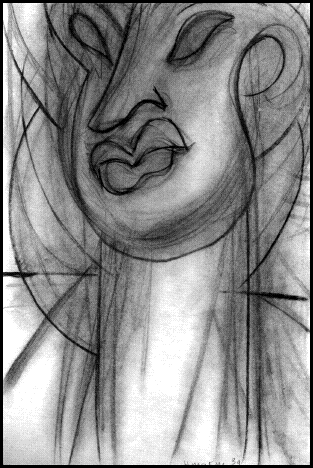Margaret Oliphant
Elisabeth Jay, Editor
(Broadview Press)
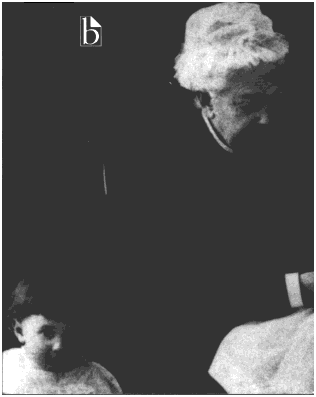
98 novels, 50 or more short stories, nearly 400 articles, and 25 non-fiction works, including biographies, literary histories, and historical guides to great cities.
And, too, needless to say, she produced this autobiography. She worked on it sporadically, mostly using it as confessional for those times of death:
My dear little Marjorie was always pale and delicate, but with glorious eyes --- to think of an eight months' old baby having these! But I remember that as she died she opened them widely and seemed to fix them on me as she lay on my knee, giving up her little soul in that look of consciousness, as it appeared to me. That was in 1855, thirty-six years ago, but I have never forgot the look with which that baby died.
These are the words she wrote in 1890, the weeks after the death of her son (with the unfortunate name of "Tiddy"). These were obviously dashed off in the moment, and come across as non-stop mourning --- what modern shrinks would call "venting, " (thus, in our day and age times, grieving is likened to the escaping gases of industrial boilers).
God has taken away my Tiddy, God keep him. Oh, if I could but follow my boy in thought where he is yours, if I could but feel how it is, if not where he is. I am not afraid of my God. O my, my father almighty, I am not afraid of thee. Thou wilt cradle him in thy arms. Thou wilt comfort him as one whom his mother comforteth ... His life has failed, his future in this world was without hope. Lord of Lords thou art holding him awful in thy arms before he begins the sweet, the better life.
Quickly she turns (as we all must) to thoughts of her own dying:
I've again, I know, been thinking and thinking in anguish what will he do when I die, and now the question is solved. I have been permitted to do everything for him, to wind up his young life, to accept the thousand and thousand disappointments and thoughts of what might have been. It is only heartache that cries out, not my judgment.
There is still a touch of English wry here and there. In 1887, Oliphant sent some of her verses to Queen Victoria, who responded with a medal of honor. Oliphant writes,
On the whole Her Majesty had the best of the bargain, for the verses were not bad of their kind and the medal was.
But, for the most part, this is a chronology of non-stop mourning. Writing about tragedy must be done with restraint; at the least, there must be interludes to let the reader recover. Because it lacks these measured caesuras, The Autobiography of Margaret Oliphant is tough going. Those of us who write are familiar with the experience --- unbearable grief causes us to fill the page, page after page, with words, flooding the flood of words with our tears. However, it is often as not literature with passion but literature without art.
The editor of this volume writes, "An innate elasticity of temperament, she ruefully lamented, meant that her life must always fall short of the dignity of tragedy." We're not too sure what this means: Oliphant got full-bore tragedy, and came up with whatever she could muster to survive it. She never learned, probably didn't care about, the disciplines that one must impose on what the Germans refer to as Todenleiden.
Since she was well read, she had available to her a surfeit of examples of how to write tragedy, from Euripides and Sophocles down through Shakespeare and Jonson to Keats and Tennyson. A private journal is hardly the place to run into a balance between measured contemplation and untrammeled grief. Judged as a work of art, the Autobiography must be viewed as a failure. Judged as a testament of a Victorian woman's expression of almost insufferable woe, it can be viewed as a tormented success.
Hundred
Demons
Lynda Barry
(Sasquatch Books)
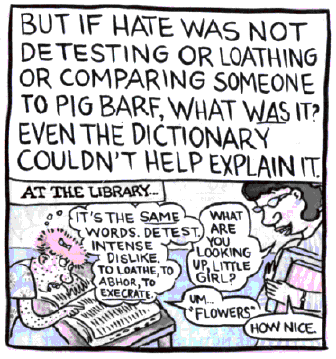
hand-scroll painted by a Zen monk named Hakuin Ekaku, in 16th Century Japan.
At first they freaked her, but then she started to love watching them come out of her paint brush...She hopes you will dig these demons and then pick up a paint brush and paint your own!
According to the title of the book, there are a hundred demons, but to judge by the table of contents, it looks like a mere seventeen, including "Magic," "Dogs," "My First Job," "Cicadas," "Hate," and "Head Lice and My Worst Boyfriend." Once you get into it, however, we discover the real demons: her frizzly hair, her face, all her boyfriends, her classmates at school who make fun of her smell, television, teachers, dogs, and, most of all her mother, frown on face, cigarette in mouth, finger pointing: "You wait! You'll see! You'll be so sorry you ever had kids! Children are a punishment! You just wait!"
When we first opened One Hundred Demons, we thought it to be a juvenile Roz Chast --- you recall her cartoons now appearing weekly in The New Yorker, those wild-eyed Manhattan types looking dumpy and lost, with neo-neurotic words framed in balloons popping out of their minds or their mouths. But after a few pages, we realize that Lynda Barry lives in another dimension entirely. There she is as a kid, complete with exploding red hair and freckles, listening to the neighbor lady say,
Your Orientals have an array, with your Chinese smelling stronger than your Japanese and your Koreans somewheres in the middle and don't get me started on your Filipinos.
Lynda's Filipino grandmother responds,
You know, my darling, God has made every people! And every people makes ta-ee! And every ta-ee smells bad! Ask this lady does perfume come out of her pueet? N'ako, I don't think so, darling! It is not God's way. You tell her!
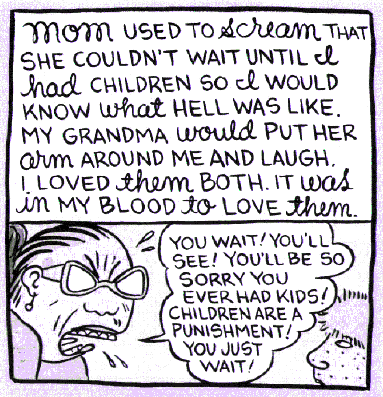 Those of us who grew up in the 50s fell in love with Pogo (and his creator, Walt Kelly). Fifteen years later it was Fritz the Cat (R. Crumb). More recently, it's been Doonsbury (Gary Trudeau) and the acerbic and wonderfully political Boondocks (Aaron McGruder). Now, it's Lynda Barry (and her creator, Lynda Barry).
Those of us who grew up in the 50s fell in love with Pogo (and his creator, Walt Kelly). Fifteen years later it was Fritz the Cat (R. Crumb). More recently, it's been Doonsbury (Gary Trudeau) and the acerbic and wonderfully political Boondocks (Aaron McGruder). Now, it's Lynda Barry (and her creator, Lynda Barry).
Note: For those who wish to be a cartoonist in the Barry style, on the last few pages she gives complete directions --- equipment needed, where to order it, how to prepare it, how to hold the brush, all put together with appropriate illustrations (drawings on how to draw drawings). It's titled "Paint Your Demon." She doesn't explain, however, how to access the droll wit you would have to have to be a perfect mirror twin Lynda Barry.
Annotated &
Explained
Max Müller, Translator
Jack Maguire, Annotations
(Skylight Paths)
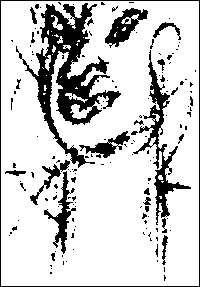
Buddhism is a religion of individual practice and enlightenment, aided by direction from a living teacher and, to a lesser degree, personal study of the Buddhist texts.
We live happily indeed when we are not hating those who hate us! Among those who hate us let us dwell free from hatred!
Or:
We live happily indeed when we are free from greed among the greedy! Among those who are greedy let us dwell free from greed!
Or:
We live happily indeed when we call nothing our own! We shall be like the bright gods, feeding on happiness!
The editors have placed copious notes on the pages facing these dicta. Thus "Happiness," explains Maguire, is "the opposite of dukkha or 'suffering...' The meaning here is the state in which one lives when one has ended suffering."
Across from aphorism #3, which goes,
We live happily indeed when we are free from ailments among the ailing! Among those who are ailing let us dwell free from ailments!
Maguire writes,
The intent in the verse is not to discount compassion for those among us who are ailing physically, emotionally, or spiritually. We are not made happy because we are better off than the ones around us. We can only be made happy when we are free from the ailments even though others around us are not. Contributing to this kind of happiness is the fact that we are then free to help others who are suffering.
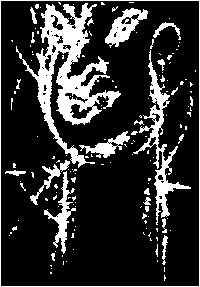 Perhaps as interesting as the aphorisms is the Forward by Andrew Harvey, the Series Editor. He says that he went through three stages over the years in his study of The Dhammapada. The first was an uncritical admiration for the Buddha and his teachings --- the fact that it was free from superstition and "cultic rituals." He saw it as a "disciplined, self-responsible path to awakening."
Perhaps as interesting as the aphorisms is the Forward by Andrew Harvey, the Series Editor. He says that he went through three stages over the years in his study of The Dhammapada. The first was an uncritical admiration for the Buddha and his teachings --- the fact that it was free from superstition and "cultic rituals." He saw it as a "disciplined, self-responsible path to awakening."
Then, years later, immersed in what he calls the "Divine Feminine," he found himself critical of the aspects in Buddhism that degraded womanhood. Even though he saw it as a result of the times in which the Buddha lives --- with its "masculine rejection" of "home, marriage, sexuality" --- he asked,
How could any philosophy that rejected much of earth life and a great deal of the feminine authentically reflect divine unity?
He concluded that it embodied an "unexamined pessimism that underlies his description of life."
Finally, in the third stage of his studies of these documents, he came to develop more tolerance:
Once I saw and accepted the patriarchal distortion in the Buddha's teachings and saw how they can color and limit the vision of women, desire, the body, and enlightenment itself, I am now free to celebrate what remains timeless and all embracing in them.
The three remaining truths he uncovered were:
- The Buddha's "unwavering awareness of suffering and evil;"
- The Buddha's insistence on "the necessity of training and 'guarding' the mind;" and
- Compassion.
"She abused me, he beat me, she defeated me, he robbed me." In those who harbor such thoughts, hatred will never cease. "She abused me, he beat me, she defeated me, he robbed me." In those who do not harbor such thoughts, hatred will cease. For never does hatred cease by hatred at any time. Hatred ceases by love. This is an eternal law.
